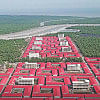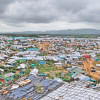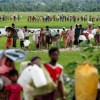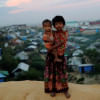Rohingyas with disabilities suffering in camps: HRW
Overcrowded, hilly and rain-soaked mega camp for Rohingya refugees is precarious for everyone, but especially for people with disabilities, Human Rights Watch said today in a new video.
"Walking through the camps, we found large numbers of Rohingya refugees with disabilities," said Bill Frelick, refugee rights director at Human Rights Watch in the video message published in its website. "Many of the people in the camp had acquired their disabilities from brutal attacks by Myanmar's military."
Despite efforts by the United Nations, humanitarian organisations, and the refugees themselves to build handrails, many walkways are impassable for people who have difficulty walking, the HRW claimed. Hussein Ahmad, whose 17-year-old son was shot in the neck during their escape from Myanmar and is now paralysed from the waist down, said: "I thank the doctor who gave my son a wheelchair, but I can't use it because the roads are very dangerous and keep getting worse. It is time for my son to study, but he can't walk, and his life is being destroyed in front of me."
Work to shore up the hastily and haphazardly built huts and other camp structures has been hindered by the Bangladeshi government's insistence that the refugees are only staying temporarily and will soon return to Myanmar, reads the HRW post. The authorities have resisted developing camp infrastructure that would suggest a longer term stay, the organisation claims. As a result, lighting, accessible toilets, and proper walkways with handrails that are critically important for people with disabilities have been slow to develop.
"With such widespread misery and obvious needs for the Rohingya refugees generally, there is a risk that refugees with disabilities will be overlooked," Frelick said. "But this is precisely the time when the needs of people with disabilities ought to be a priority."

 For all latest news, follow The Daily Star's Google News channel.
For all latest news, follow The Daily Star's Google News channel. 








Comments